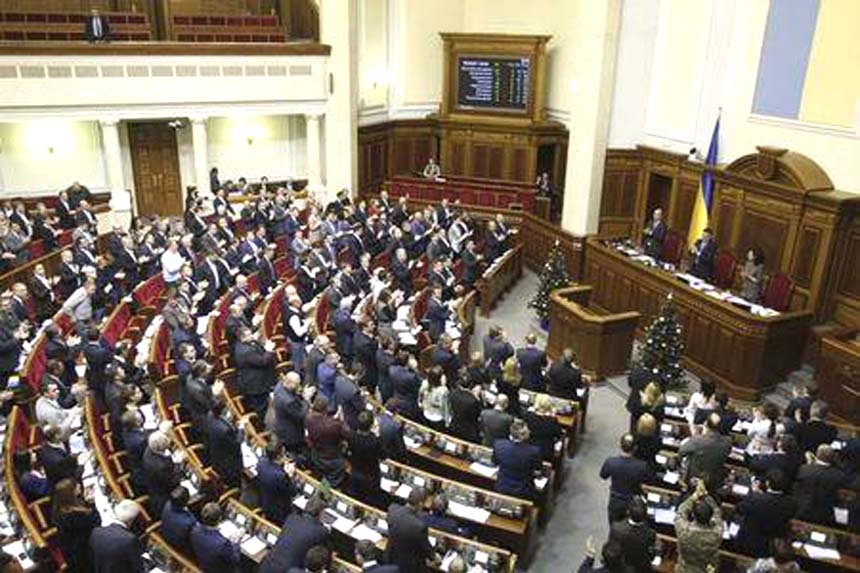
AFP, Kiev :
Ukraine took a historic step toward NATO on Tuesday in a parliamentary vote that stoked Russia’s anger ahead of talks on ending the ex-Soviet state’s separatist war.
Lawmakers in the government-controlled chamber overwhelmingly adopted a bill dropping Ukraine’s non-aligned status-a classification assumed by states that refuse to join military alliances and thus play no part in wars.
President Petro Poroshenko had vowed to put Ukraine under Western military protection after winning an election called in the wake of the February ouster in Kiev of a Moscow-backed president.
“European and Euro-Atlantic integrations-that is Ukraine’s single course,” Poroshenko tweeted moments after the 303-8 vote.
Ukraine assumed de facto neutrality under strong Russian pressure in 2010. It had sought NATO membership in the early post-Soviet era but-its once-mighty army in ruins and riven by corruption-was never viewed as a serious candidate.
Last winter’s revolution in Kiev upset Russian President Vladimir Putin’s plans to enlist Ukraine in a new bloc he was forging in order to counterbalance NATO and the European Union.
And Moscow had set Kiev’s exclusion from all military unions as a condition for any deal on ending the pro-Russian uprising that has killed 4,700 in the eastern Ukrainian rustbelt in the past eight months.
Putin’s view of NATO as modern Russia’s biggest threat has only been reinforced by this year’s dramatic spike in East-West tensions over Ukraine.
Russian Foreign Minister Sergei Lavrov demanded that Kiev “put an end to confrontation” and stop adopting “absolutely counterproductive” measures that only stoked tensions between the two sides.
Prime Minister Dmitry Medvedev said even more bluntly that “in essence, an application for NATO membership will turn Ukraine into a potential military opponent for Russia.”
Medvedev warned that Ukraine’s rejection of neutrality and a new Russian sanctions law that US President Barack Obama signed on Friday “will both have very negative consequences.”
“And our country will have to respond to them,” he wrote in a Facebook post.
Perhaps the most immediate threat will be to delicate peace talks this week in the Belarussian capital Minsk that Poroshenko and Putin agreed on Monday.
Ukraine took a historic step toward NATO on Tuesday in a parliamentary vote that stoked Russia’s anger ahead of talks on ending the ex-Soviet state’s separatist war.
Lawmakers in the government-controlled chamber overwhelmingly adopted a bill dropping Ukraine’s non-aligned status-a classification assumed by states that refuse to join military alliances and thus play no part in wars.
President Petro Poroshenko had vowed to put Ukraine under Western military protection after winning an election called in the wake of the February ouster in Kiev of a Moscow-backed president.
“European and Euro-Atlantic integrations-that is Ukraine’s single course,” Poroshenko tweeted moments after the 303-8 vote.
Ukraine assumed de facto neutrality under strong Russian pressure in 2010. It had sought NATO membership in the early post-Soviet era but-its once-mighty army in ruins and riven by corruption-was never viewed as a serious candidate.
Last winter’s revolution in Kiev upset Russian President Vladimir Putin’s plans to enlist Ukraine in a new bloc he was forging in order to counterbalance NATO and the European Union.
And Moscow had set Kiev’s exclusion from all military unions as a condition for any deal on ending the pro-Russian uprising that has killed 4,700 in the eastern Ukrainian rustbelt in the past eight months.
Putin’s view of NATO as modern Russia’s biggest threat has only been reinforced by this year’s dramatic spike in East-West tensions over Ukraine.
Russian Foreign Minister Sergei Lavrov demanded that Kiev “put an end to confrontation” and stop adopting “absolutely counterproductive” measures that only stoked tensions between the two sides.
Prime Minister Dmitry Medvedev said even more bluntly that “in essence, an application for NATO membership will turn Ukraine into a potential military opponent for Russia.”
Medvedev warned that Ukraine’s rejection of neutrality and a new Russian sanctions law that US President Barack Obama signed on Friday “will both have very negative consequences.”
“And our country will have to respond to them,” he wrote in a Facebook post.
Perhaps the most immediate threat will be to delicate peace talks this week in the Belarussian capital Minsk that Poroshenko and Putin agreed on Monday.

